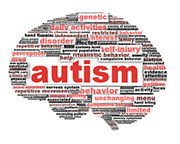- Could You Spot the Silent Symptoms of Stress?
- Gas Stoves Could Leave Your Lungs Vulnerable to Nitrogen Dioxide
- Key Therapy Equally Effective for Women, Men With Narrowed Leg Arteries
- Doctors Describe Texas Dairy Farm Worker’s Case of Bird Flu
- Does Preschool Boost Kids’ Long-Term Academic Success? Study Finds Mixed Results
- AI Might Spot Rare Diseases in Patients Years Earlier
- An Orangutan Healed Himself With Medicinal Plant
- Quit-Smoking Meds Not Working for You? Try Upping the Dose
- Fewer Americans Are Suffering Most Dangerous Form of Heart Attack
- Even Skipping Meat for One Meal Helps Liver Disease Patients
Adults With Autism at Risk for Many Health Problems: Study

Autism apparently isn’t a stand-alone disorder, with new research revealing that adults with autism often face a host of mental and physical illnesses.
Kaiser Permanente researchers found that nearly all medical conditions are significantly more common in adults with autism spectrum disorders than those without, ranging from depression to gastrointestinal problems to obesity. Notably, however, adults with autism are much less likely to smoke or use alcohol than other adults, and cancer rates are similar.
“Some of these conditions we’ve seen in children with autism, so we expected higher rates of anxiety and depression, and some of the medical disorders, such as gastrointestinal disturbances, in adults,” said study author Lisa Croen, director of the Kaiser Permanente Autism Research Program in Oakland, Calif.
“That’s been reported for a long time in children, so we’re not surprised to see those continue to be elevated,” she added. “But we were surprised by the magnitude of what we found.”
The study is scheduled to be presented Thursday at the International Meeting for Autism Research in Atlanta. Research presented at scientific conferences typically has not been peer-reviewed or published and results are considered preliminary.
Diagnosed in about 1 in 68 American children, autism spectrum disorder is the fastest-growing serious developmental disability in the United States, according to the advocacy and research organization Autism Speaks.
The disorder can be mild or severe, but symptoms typically include social and communication difficulties and repetitive behaviors.
Croen and her colleagues examined medical records from 2008 to 2012, and compared the prevalence of psychiatric, behavioral and medical diagnoses among 2,100 adults with an autism spectrum disorder to 21,000 adults without the disorder.
Adults diagnosed with an autism spectrum disorder had markedly higher rates of mental health problems than the other adults:
- Depression (38 percent versus 17 percent)
- Anxiety (39 percent versus 18 percent)
- Bipolar disorder (30 percent versus 9 percent)
- Suicide attempts (1.6 percent versus 0.3 percent)
People with autism spectrum disorders were also more likely than adults without the disorder to have physical ailments, such as:
- Diabetes (6 percent versus 4 percent)
- Gastrointestinal disorders (47 percent versus 38 percent)
- Epilepsy (12 percent versus 1 percent)
- Sleep disorders (19 percent versus 10 percent)
- High cholesterol (26 percent versus 18 percent)
- High blood pressure (27 percent versus 19 percent)
- Obesity (27 percent versus 16 percent)
“What the data show is really an extension of what we’ve learned already of children and adolescents with autism,” said Dr. Paul Wang, senior vice president and head of medical research for Autism Speaks, who wasn’t involved in the study. “It’s not just a brain disorder — it’s really a disorder that affects the whole body. And this shows that these problems don’t go away.”
Croen said that many possible reasons exist for the wide gap in mental and physical ailments suffered by adults with autism, including a potential genetic basis. But the “core impairments” of those with autism — such as communication problems and heightened sensitivity to touch — can also make it difficult for them to be properly examined by clinicians, she said.
“People with autism often have very selective eating and their nutrition suffers,” Croen added. “Their social impairments can lead to isolation, which leads to a lack of exercise. So some lifestyle factors can create more unhealthy lifestyles.”
Social isolation may also explain why adults with autism are less likely to drink alcohol or smoke, noted Croen, also a senior research scientist at Kaiser Permanente Northern California Division of Research.
“Smoking and drinking are more social behaviors, especially in young people,” she said. “Or, that’s how it gets started. These young people with autism are out of the mainstream.”
Croen and Wang agreed that autism researchers should extend their focus beyond the brain to multiple bodily systems as well as examine the transition from pediatric to adult health care.
“I hope these findings raise awareness among the medical community and others that adults with autism have a really high burden of medical and psychiatric conditions, much more than people think,” Croen said. “There’s a real need for doctors to be educated about autism and the characteristics of these adults so they can provide adequate and effective care.”
More information
The U.S. Centers for Disease Control and Prevention has more about autism spectrum disorders.
Source: HealthDay
Copyright © 2024 HealthDay. All rights reserved.










